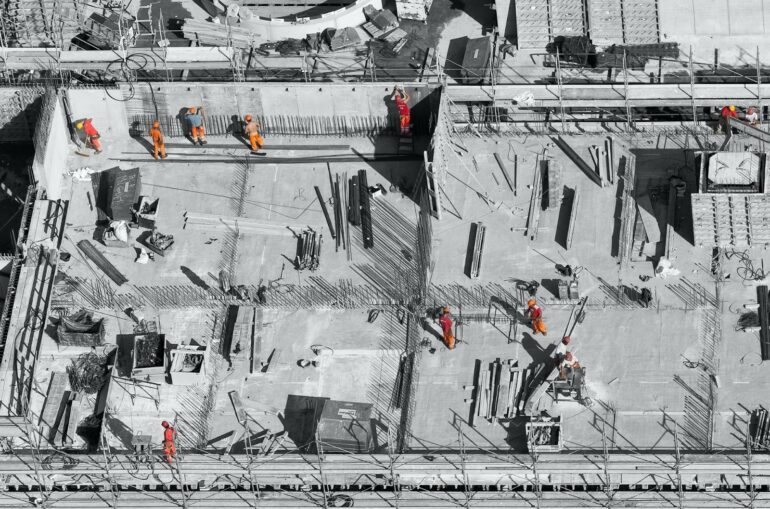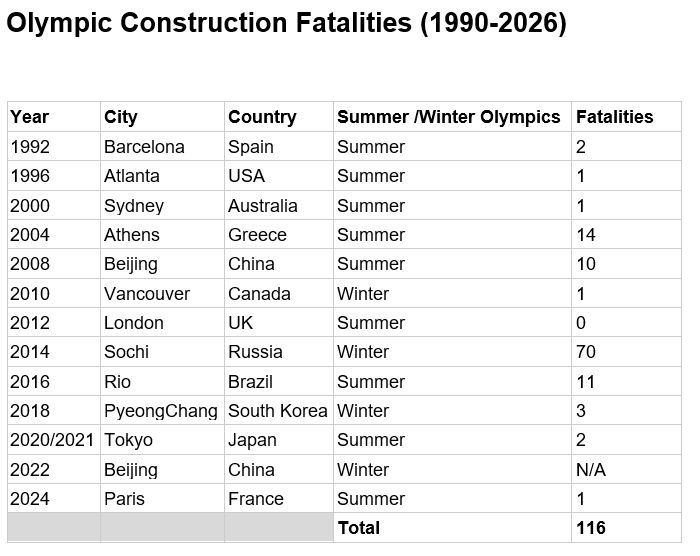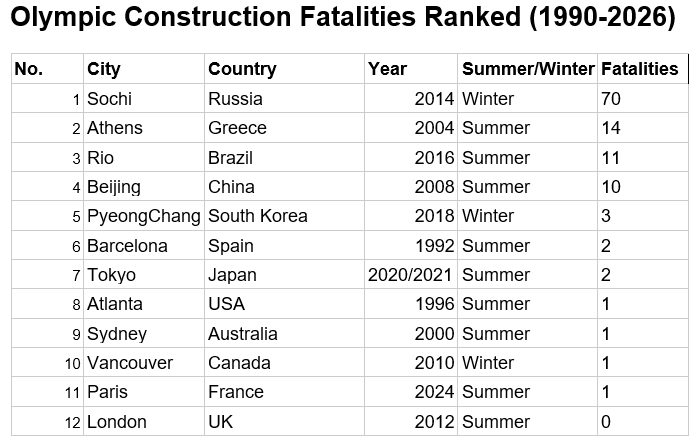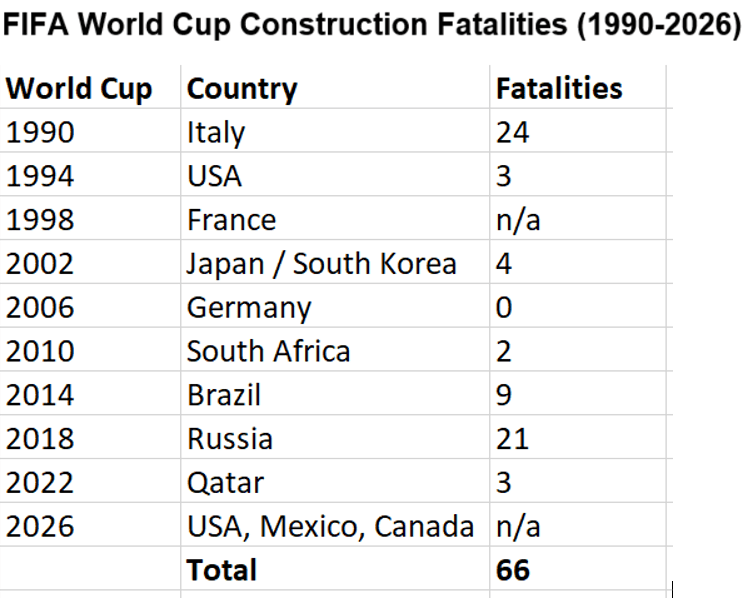Tokyo 2020 was an absolute spectacle, even without fans. While the Olympics has always had the ability to bring the world together to celebrate sporting excellence, the upheaval and uncertainty brought about by the COVID-19 pandemic ensured that this year was always going to be a bit different.

(Image Credit: Unsplash)
After a spectacular closing ceremony, held at purpose-built Japan National Stadium, it’s safe say that Japan achieved something truly spectacular.
But it didn’t come without cost.
In 2017, a construction worker took their own life after clocking 200 hours of overtime while working on the site. And in 2018, a construction worker was killed after an accident involving a crane and scaffolding.
Indeed, the Olympics has a long history of health and safety fatalities.
According to research conducted by Rhino Safety, there have been 116 construction-related fatalities tied to the Olympics in the last 30 years.
70 fatalities were reported during construction of the 2014 Winter Olympics, in Sochi, Russia, marking it as the country with the most deaths in the last 30 years. This puts it ahead of the 14 fatalities recorded for the 2004 Summer Olympics in Athens.
And those are only the ones that have been officially reported.
In contrast London 2012 is considered the safest Olympic build in history. It recorded 0 fatalities, with a reported injury rate of 0.17 per 100,000 person-hours – far below the 0.55 building industry average in the UK. The effort lasted four years and was completed on time and under budget.
 However, as the results show, subsequent Olympics have not been able to achieve the same success says Simon Walter, Director at Rhino Safety: “Unfortunately, health and safety fatalities tied to the Olympic construction isn’t a new or even surprising subject – and it’s not hard to see why.
However, as the results show, subsequent Olympics have not been able to achieve the same success says Simon Walter, Director at Rhino Safety: “Unfortunately, health and safety fatalities tied to the Olympic construction isn’t a new or even surprising subject – and it’s not hard to see why.
“Host nations are expected to construct some of the most impressive sporting facilities on the planet, and an infrastructure capable of supporting hundreds of thousands of people. These are large scale projects on their own – together they are momentous.
“Often awarded seven or eight years beforehand, they’re expected to complete within a tight deadline and an even tighter budget, which means that construction projects are operating under a significant amount of pressure. And as history has shown, it often comes at the cost of health and safety.’
It’s a sobering statement that has already proven true. The International Olympic Committee (IOC) announced that France would host the 2024 games in 2017; in 2020, a worker was killed while working on the Grand Paris Express, a metro-link that would form an important part of the city’s Olympic infrastructure.
The Government had repeatedly announced that it intended the project to be completed ahead of the games. However, recent reports now indicate that the project, repeatedly dogged by issues, will not be ready until 2026, two years after the games have taken place.
Commenting on the findings, Mr Walter suggests that the Olympics, and indeed other international sporting events, are powerful reminders of what happens when progress is prioritised before health and safety.
“International sporting events often bring to the fore external pressures that can put overwhelming pressure on project management, which can have a knock-on effect on how health and safety is implemented and managed throughout construction
“Tight timelines, even tighter budgets, contract rights, national and international oversight, labour rights, economic pressure and a need to boost their international reputation often means that pressure is piled on, corners can be cut, and rules and essential practices ignored – just to make sure that targets are hit.
“This often means that basic health and safety protocols aren’t followed, ethical practices are ignored, labour and employment rights are infringed, project management suffers, and that injuries and fatalities are underreported or swept under the carpet completely.

“These issues are factors that can affect all construction projects. The difference is that it’s happening on the world stage. This should put pressure on countries to be even more diligent about health and safety – but that’s just not the case. In reality, these issues can develop, and are in some ways even tolerated as long as the work is completed – for many countries, failure or delay isn’t an option.
“Accountability is important. As we look to future sporting events, every country should do its part to ensure that we can celebrate the world’s greatest sporting event knowing it didn’t come at the cost of easily implementable and much needed health and safety.”
Mr Walter’s call to action comes at a time where construction for international events is under increased scrutiny. A report from the Guardian recently revealed that as many as 6,596 migrant workers have died in Qatar since the 2022 World Cup was awarded.



*Beyond the three deaths reported for the 2022 World Cup in Qatar, 34 non-work-related deaths have been recorded. As per the UK RIDDOR guidelines, these deaths were classified as natural causes and not considered work-place incidents. More details can be found here.
Human rights issues have been under scrutiny since the World Cup was awarded to Qatar in 2010. According to the BBC, a UEFA delegation visiting Qatar to assess workers’ rights says progress has been made but more work is needed ahead of the 2022 World Cup.
*Fatalities compiled through multiple news sources
Read: Qatar 2022: More needed to protect workers
Read: Qatar 2022: ‘Inherently unsafe’ work practices led to death
The Safety Conversation Podcast: Listen now!
The Safety Conversation with SHP (previously the Safety and Health Podcast) aims to bring you the latest news, insights and legislation updates in the form of interviews, discussions and panel debates from leading figures within the profession.
Find us on Apple Podcasts, Spotify and Google Podcasts, subscribe and join the conversation today!


 However, as the results show, subsequent Olympics have not been able to achieve the same success says Simon Walter, Director at Rhino Safety: “Unfortunately, health and safety fatalities tied to the Olympic construction isn’t a new or even surprising subject – and it’s not hard to see why.
However, as the results show, subsequent Olympics have not been able to achieve the same success says Simon Walter, Director at Rhino Safety: “Unfortunately, health and safety fatalities tied to the Olympic construction isn’t a new or even surprising subject – and it’s not hard to see why.




Thought Provoking ! What price sport ?
“Is a big stadium more valuable than Life ?” is clearly a question some countries need to be held to account over. But who holds them to account ?
The problem as I see it, is that EVERYONE knows what it costs to be healthy and safe but NO ONE seems to know or care about the value. Capitalism and its machinations are only concerned with greed and profit. Stake holders are indeed more interested in a stadium than a life. This doesn’t just relate to sports stadia but extends to all things materialistic. Money rules-buy cheap sell expensive. Im afraid that after 50+ yrs in engineering and industry I see the race to the bottom nearing its completion. Competency training is ALWAYS judged by lowest price as does… Read more »